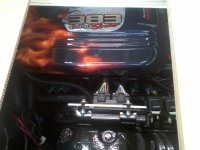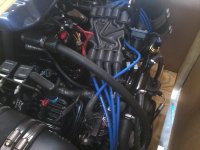Docksidemarineservices
Silver Medal Contributor
Replacing heads on a 6.2 liter, while torquing the new head bolts the #5 bolt broke before the final torque 0f 66lbs. The broken bolt was easily removed with the smallest easy-out so the bolt was not bound in the cylinder deck threads.
Bought another set of bolts from the local machine shop. Started in again with another new head gasket. This time on the final torque pass 66lbs, the # 3 short bolt broke. Again removed easily with the smallest easy-out.
It's not my torque wrench. Guaranteed. Tried two different ones.
So, does anyone have some insight on this?
On the final assembly, I used a torque angle gauge. Have not fired the engine yet.
Bought another set of bolts from the local machine shop. Started in again with another new head gasket. This time on the final torque pass 66lbs, the # 3 short bolt broke. Again removed easily with the smallest easy-out.
It's not my torque wrench. Guaranteed. Tried two different ones.
So, does anyone have some insight on this?
On the final assembly, I used a torque angle gauge. Have not fired the engine yet.




